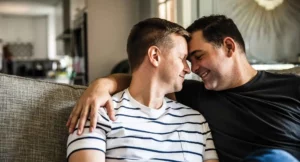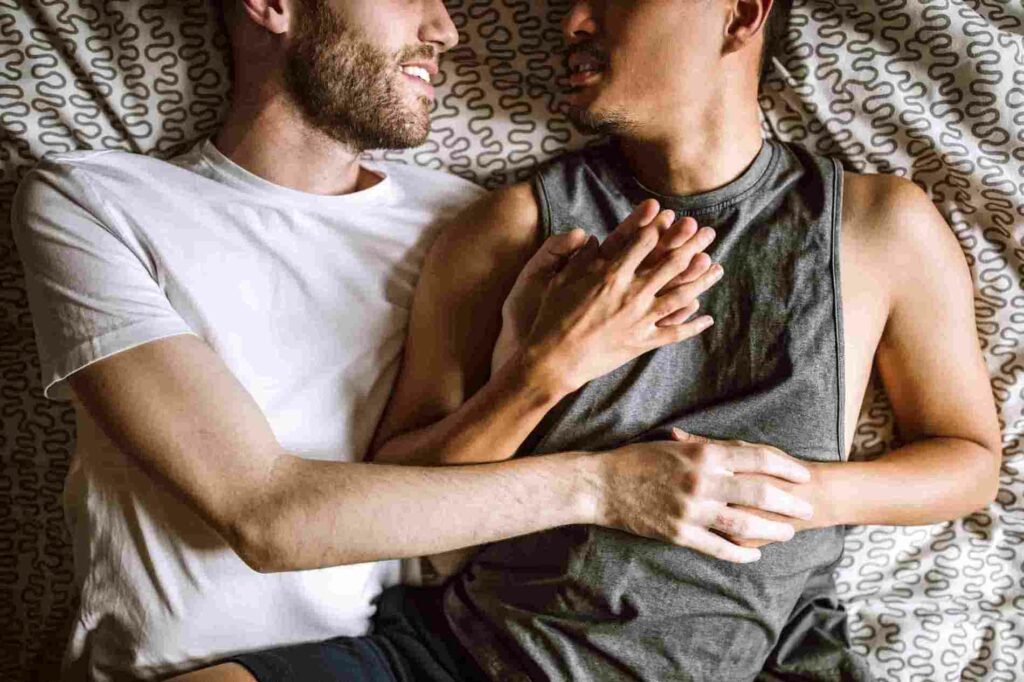Like any romantic relationship, gay couples face their own unique set of challenges and triumphs. Although love is universal, each relationship presents its unique complexities, which require understanding, patience, and sometimes, professional assistance. Gay couple therapy is an avenue to help partners navigate through these complexities, fostering stronger communication, understanding, and intimacy. This blog aims to shed light on the importance of gay couple’s therapy, offering guidance to those who seek healthier, happier relationships.
Contents
What Does Gay Couple Therapy Define?
 Gay couple therapy is also referred to as LGBTQ+ couples therapy or same-sex couples therapy. It is a specialized branch of relationship therapy that is focused on addressing the unique emotional, psychological, and societal challenges faced by gay couples. Like all forms of couples therapy, its ultimate goal is to foster healthier, happier relationships. However, this type of therapy recognizes that gay couples may encounter distinct issues that stem from their sexual orientation. Such as societal prejudice, familial acceptance, and identity-related stress.
Gay couple therapy is also referred to as LGBTQ+ couples therapy or same-sex couples therapy. It is a specialized branch of relationship therapy that is focused on addressing the unique emotional, psychological, and societal challenges faced by gay couples. Like all forms of couples therapy, its ultimate goal is to foster healthier, happier relationships. However, this type of therapy recognizes that gay couples may encounter distinct issues that stem from their sexual orientation. Such as societal prejudice, familial acceptance, and identity-related stress.
In the safe and affirming environment of gay couple therapy, partners can explore their relationship dynamics, unpack personal and shared issues, and work together to build effective communication and conflict resolution strategies. The therapist, with their specialized understanding of LGBTQ+ issues, facilitates this process, helping couples navigate complex emotions and cultivate deeper understanding and intimacy.
What Are The Challenges In Gay Relationships?
Gay relationships, like any other type of relationship, face a myriad of general challenges such as:
- communication difficulties
- intimacy issues
- trust breaches
- disagreements about key life decisions
However, gay couples may also encounter unique challenges that stem from living in a heteronormative society. Here are some of those specific challenges:
- Societal Stigma and Discrimination: Despite increasing acceptance, LGBTQ+ individuals still face considerable stigma and discrimination. This can add external pressure to a relationship, sometimes creating a sense of isolation or negatively impacting mental health.
- Family Acceptance: Some individuals may struggle with acceptance from their family of origin. Family rejection can cause significant emotional distress and can put a strain on the couple’s relationship.
- Internalized Homophobia: Growing up in a heteronormative society can lead some individuals to internalize negative attitudes, beliefs, or stereotypes about homosexuality. That can result in feelings of shame or inadequacy that impact their relationship.
- Coming Out Process: The process of coming out, or disclosing one’s sexual orientation to others, can be stressful and emotionally draining. And reactions can significantly impact the individual and their relationship.
- Lack of Representation: Limited representation of healthy, successful gay relationships in media and society can make it difficult for some individuals to imagine or strive for success in their own relationships.
- Identity-Related Stress: The stress of managing a stigmatized identity, such as being “in the closet” at work or having to constantly assert one’s identity, can take a toll on mental health and relationships.
While not all gay couples will experience these challenges. Still, many will also share common difficulties faced by any couple, it’s important to acknowledge these potential issues to better understand and support the mental health and wellness of individuals in same-sex relationships.
What Techniques Are Used In Gay Couple Therapy?
 Therapists employ various techniques in gay couple therapy to help partners communicate more effectively, resolve conflicts, and deepen their understanding and intimacy. The specific methods can vary greatly based on the therapist’s training and approach, and the unique needs of the couple. Here are a few common techniques:
Therapists employ various techniques in gay couple therapy to help partners communicate more effectively, resolve conflicts, and deepen their understanding and intimacy. The specific methods can vary greatly based on the therapist’s training and approach, and the unique needs of the couple. Here are a few common techniques:
- Cognitive-Behavioral Therapy (CBT)
This involves identifying and challenging negative thought patterns and behaviors, and replacing them with healthier, more positive ones. It can be particularly helpful for dealing with internalized homophobia, self-esteem issues, or communication problems.
- Emotionally Focused Therapy (EFT)
EFT is used to help partners better understand each other’s emotions and emotional needs, to foster a deeper emotional connection. This can be especially beneficial for couples struggling with emotional intimacy or expressing their feelings.
- Narrative Therapy
This approach helps individuals rewrite their personal and relationship narratives in a more positive and empowering way, which can be particularly helpful in dealing with the effects of societal stigma or family rejection.
- Mindfulness-Based Techniques
These are used to promote present-moment awareness and non-judgmental acceptance, helping partners to improve their emotional regulation, increase their empathy for each other, and reduce their reactivity during conflicts.
- Affirmative Therapy
Affirmative therapy is an approach that not only accepts an individual’s sexual orientation, but also helps them explore how it intersects with other aspects of their identity, and how societal attitudes have impacted their self-concept and relationships. This can be crucial for LGBTQ+ individuals who have faced discrimination or prejudice.
- Psychoeducation
Teaching about the unique challenges faced by gay couples can help partners better understand each other’s experiences, normalize their struggles, and reduce any feelings of isolation or stigma.
Each couple is unique, and a good therapist will tailor their approach to the specific needs and goals of the couple. And ensure that the therapy environment is a safe and affirming space for both individuals.
What People Can Expect With This Therapy?
Engaging in gay couple’s therapy can be a transformative journey. It’s important to remember that each therapy process is unique to the couple and the therapist. But here’s a general idea of what individuals can expect:
- Building Trust: The therapist will first focus on creating a safe, non-judgmental, and confidential space for the couple to share their experiences, concerns, and hopes.
- Understanding the Relationship: The therapist will encourage open discussion about the relationship, exploring its history, current dynamics, strengths, and areas of concern. This process helps to identify patterns of behavior and areas that need attention.
- Skills Development: Couples can expect to learn and practice new skills for better communication, conflict resolution, and emotional understanding. The therapist will often suggest exercises or strategies to try between sessions.
- Addressing Individual Issues: The therapy process might also involve exploring individual issues that are affecting the relationship, such as stress, mental health conditions, or experiences of discrimination or stigma. The therapist can provide support and resources for managing these issues.
- Progress Evaluation: Over time, the therapist will check in with the couple about their progress toward their therapy goals, and adjust the therapy plan as needed. This ensures that therapy stays relevant and helpful.
- Termination and Follow-up: Once the couple has achieved their therapy goals, or made significant progress, therapy may end. However, the therapist will often provide resources for continued self-care and growth, and may suggest periodic check-ins or follow-up sessions to maintain the gains made in therapy.
The overall aim of gay couple’s therapy is to help partners understand each other better, communicate more effectively, and navigate their relationship in a way that fosters mutual growth, respect, and fulfillment. It’s a process that requires honesty, openness, and commitment from both parties.
Some Myths And Misconceptions About Gay Couple Therapy
 Despite its proven benefits, gay couple’s therapy is often misunderstood, leading to numerous myths and misconceptions. Here are some of the most common ones:
Despite its proven benefits, gay couple’s therapy is often misunderstood, leading to numerous myths and misconceptions. Here are some of the most common ones:
- Myth: Gay couple’s therapy is only for couples on the brink of a breakup.
Reality: While therapy can certainly help couples facing severe issues, it is also beneficial for those simply wanting to improve their communication, deepen their emotional connection, or navigate changes in their relationship. It’s a tool for relationship growth, not just a last resort.
- Myth: Gay couple’s therapy means there is something “wrong” with being gay.
Reality: The need for therapy doesn’t imply that being gay is the problem. Rather, therapy addresses the unique challenges that some gay couples face due to societal prejudices, stigma, and the pressures of living in a heteronormative world.
- Myth: Therapists will take sides during the therapy.
Reality: A professional therapist is trained to remain neutral and supportive to both parties. Their role is to facilitate open and honest communication, not to judge or favor one partner over the other.
- Myth: In gay couple’s therapy, therapists will force couples to conform to heteronormative relationship roles.
Reality: Ethical therapists, especially those trained in LGBTQ+ affirmative therapy, recognize and respect the diversity of relationships. They work to help each couple find dynamics that work for them, without imposing heteronormative stereotypes.
- Myth: Therapy is a quick fix for relationship issues.
Reality: Therapy is a process, and change often takes time. Each couple is unique, and the length of therapy will depend on the complexity of the issues they’re facing, their goals, and their dedication to the process.
Conclusion
In conclusion, gay couple therapy is an invaluable tool that can help same-sex couples navigate the unique challenges they face, foster effective communication, and build deeper understanding and intimacy in their relationship. It is a specialized form of therapy that accommodates the specific issues experienced by gay couples. Also, actively works to dismantle heteronormative assumptions and provide an affirming and supportive space.
Addressing and resolving a couple of issues is essential for a strong and lasting partnership. If you have any queries regarding Online Couple Counseling experienced therapists at CoupleMantra can help. Book a trial couple therapy session.


